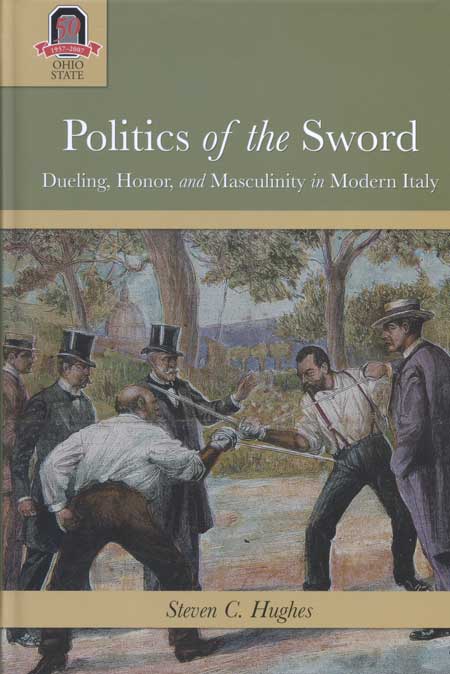| click here to read excerpts of the book | leave / read comments and critiques of the book |
 Politics of the Sword
Politics of the Sword
Dueling, Honor, and Masculinity in Modern Italy
Steven C. Hughes
“Steven C. Hughes brilliantly explores the multiple meanings and functions of the Italian duel from the Napoleonic era through the 1920s. His accomplishment is to identify, within what was a pan-European phenomenon, the contours of a specifically Italian dueling culture and, on this basis, to offer important new readings of Italian nation building and the dynamics of politics and society under the country’s postunification liberal regime. The result is a fascinating analysis of the merging of liberal precepts and chivalric traditions in the building of modern Italy. . . . [T]his is an important and excellent piece of work that deserves a wide readership.” —Journal of Modern History
“This work provides a valuable addition to our knowledge of post-Unification Italy and to its construction of Italian masculinity. It will be required reading for all students of Italian modernity.” —American Historical Review
Following its creation as a country in 1861, Italy experienced a wave of dueling that led commentators to bemoan a national “duellomania” evidenced by the sad spectacle of a duel a day. Pamphlets with titles like “Down with the Duel” and “The Shame of the Duel” all communicated the passion of those who could not believe that a people supposedly just returned to the path of progress and civilization had wholeheartedly embraced such a “barbaric” custom. Yet these critics were consistently countered by sober-minded men of rank and influence who felt that the duel was necessary for the very health of the new nation.
Steven C. Hughes argues that this extraordinary increase in chivalric combat occurred because the duel played an important role in the formation, consolidation, and functioning of united Italy. The code of honor that lay at the heart of the dueling ethic offered a common model and bond of masculine identity for those patriotic elites who, having created a country of great variety and contrast for often contradictory motives, had to then deal with the consequences. Thus dueling became an iconic weapon of struggle during the Risorgimento, and, as Italy performed poorly on the stage of great power politics, it continued to offer images of martial valor and manly discipline. It also enhanced the social and political power of the new national elites, whose monopoly over chivalric honor helped reinforce the disenfranchisement of the masses. Eventually, the duel fed into the hypermasculinity and cult of violence that marked the early fascist movement, but in the end it would prove too individualistic in its definition of honor to stand up to the emerging totalitarian state. Although Mussolini would himself fight five duels at the start of his career, the duel would disappear along with the liberal regime that had embraced it.
Steven C. Hughes is professor of history at Loyola College in Maryland.
|
Nov 2007 History/Europe/Italy; Social Science/Criminology 424 pp. 6x9 |
|
| $99.95 cloth 978-0-8142-1072-7 | Add cloth to shopping cart |
| $14.95 CD 978-0-8142-9149-8 | Add CD to shopping cart |


